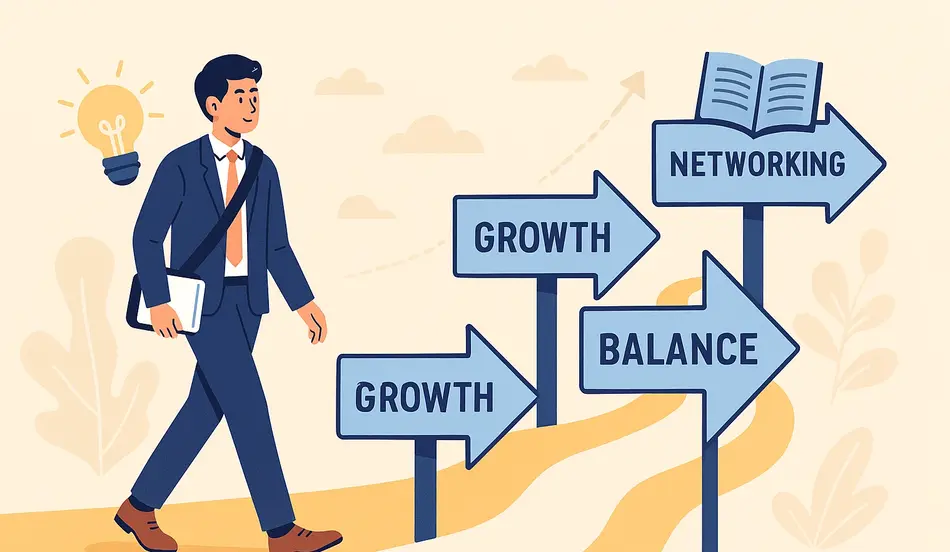Your 20s are often painted as the decade when you’re supposed to “figure it all out.” In reality, it’s messy, full of trial and error, and defined by lessons you only learn the hard way. Looking back, the choices I made in that decade shaped my career more than any single job title or salary bump.
Here are five of the most valuable lessons I picked up in my 20s—wisdom I wish I had sooner.
1. Never Self-Reject
The single most important lesson: don’t close doors before they’re even opened.
Too often, we hold ourselves back from opportunities because we feel “underqualified.” Maybe you meet three out of five bullet points in a job description, or you assume you’re too junior for a program. But when you decide not to apply, you’ve already rejected yourself.
Early in my career, people told me I wasn’t ready for top MBA programs. The average applicant had six years of work experience; I had fewer. Still, I applied to both Oxford and Cambridge—and got accepted into both. That decision changed the trajectory of my life.
The takeaway? Let others make the decision. Your job is to show up and try.
2. Learn to Manage Your Manager
Your manager isn’t just your boss—they’re one of the most important factors in your growth.
In my 20s, I had around 10 different managers. Each had a completely different style. Some only wanted results; others wanted visibility into my daily process. I learned (the hard way) that it’s not enough to simply deliver good work—you also have to communicate it in the way your manager values.
This is called “managing up.” It means:
- Understanding your manager’s style.
- Proactively sharing updates in the format they prefer.
- Making it easier for them to advocate for you when opportunities arise.
Don’t assume great work speaks for itself. It rarely does.
3. Say Yes to New Experiences
Growth rarely comes from staying in your comfort zone.
At one point, I was on the bench at a consulting firm with no client projects. A secondment opportunity in a completely different department opened up. Many of my peers said no because it didn’t “fit” their career path. I said yes. It ended up being one of the most valuable projects I worked on—and a major highlight on my résumé.
Later, I made the leap into sustainability at Amazon, despite never having worked in that field before. Again, I said yes, and discovered a new path I truly enjoyed.
Not every opportunity is a one-way door. If it doesn’t work out, you can pivot. But you’ll never know unless you step through it.
4. Invest in Communication Skills Early
Hard skills may get you the job, but communication skills will carry your career.
Being able to write clearly sharpens your thinking and helps others understand your impact. Being able to speak confidently gives you a voice in meetings, presentations, and interviews.
In my 20s, I was terrified of speaking up. I worried about sounding unpolished or being judged. What helped me shift? Realizing that everyone in the room—even senior leaders—are just people with flaws. Once I stopped putting others on a pedestal, I found my voice.
Communication is a multiplier skill: it amplifies the value of everything else you do. Start developing it early.
5. Don’t Chase Money Alone
Yes, salary matters. But if money is the only reason you accept a role, you’ll likely end up disappointed.
Other factors matter just as much:
- Work–life balance
- Growth opportunities
- Team culture
- Relationship with your manager
- The meaning you find in your work
If a role only offers a bigger paycheck but leaves you drained or stuck, it won’t feel like progress for long. Consider the whole package, not just the number.
Final Thought: Your 20s Are About Building, Not Perfecting
When I was younger, I thought I’d have it all figured out by 30. Spoiler: I didn’t. And that’s okay. Your 20s aren’t about having a flawless plan. They’re about experimenting, learning, and building a foundation you can grow from.
So don’t self-reject. Learn to manage relationships. Say yes to opportunities. Sharpen your communication. And don’t let money blind you to what truly matters.
Your 20s are practice. The real game is still ahead.
FAQs
1. Should I apply for jobs if I don’t meet all the listed requirements?
Yes. Most employers list “ideal” qualifications, not absolute requirements. If you meet some and can show potential, apply. Don’t self-reject.
2. What does “managing up” mean in simple terms?
It means actively managing your relationship with your manager—understanding their style, keeping them informed, and making their job easier so they can support your growth.
3. How do I decide whether to say yes to an opportunity?
Ask yourself: Will I learn from this? Will it expand my skills or network? If yes, it’s often worth trying—even if it’s not a perfect fit.
4. What’s the best way to improve communication skills?
Start small: practice explaining your work in writing, contribute in meetings, and take courses or workshops. The more you practice, the easier it gets.
5. Is it ever okay to take a job purely for money?
If it’s a life-changing raise or helps you reach a specific financial goal, yes. But long-term satisfaction usually requires more than just money—look for balance and growth too.






